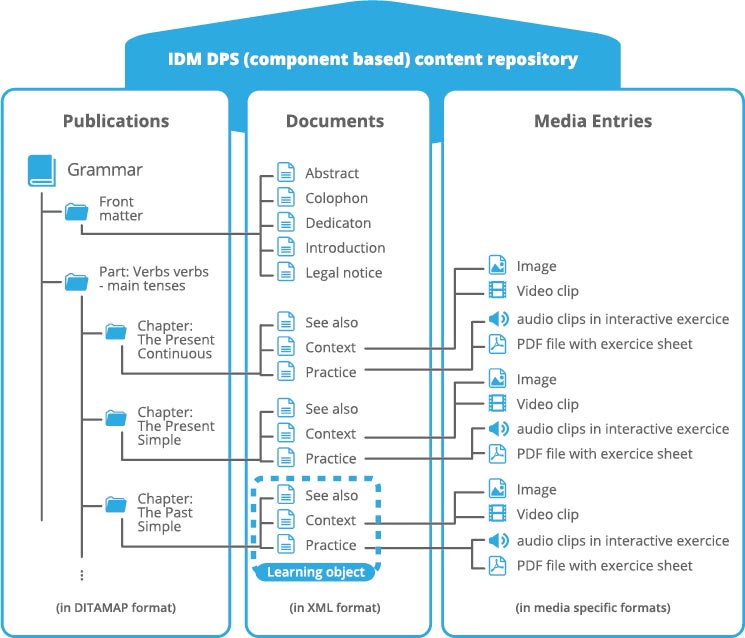helps organizations handling strict editorial processes while embracing new digital opportunities. Enter new customer segments & markets
Organizations use DPS to author, reuse and distribute content across various digital delivery channels, handled through strict editorial processes with higher control.
DPS provides full support of the XML and DITA standards, for easy editing and delivering from native XML and WYSIWYG editors, with the highest level of security.

Repository for XML content and associated medias
Full support for XML schemas and DTDs
Compliance with major data structuring standards like DITA
Hyperlinking system across documents and medias
Publication concept to handle structured sets of documents
Re-use and re-packaging of documents and medias in multiple publications
Global support for metadata across documents, publications and medias
Versatile XML content and metadata index, search and retrieve capabilities
Full REST API for all repository functions
Support for processing instructions
Full support for UNICODE and extended UNICODE character sets
Fully operational in Roman and other languages, including Chinese, Hindi, Russian, Arabic, Farsi, etc.

Global editing interface applying to publications, documents and medias
Support for XML editing both online and offline
Support for editing structured views and wysiwyg views
Automated compliance check with XML schemas and DTDs
Fast and user-friendly insertion of XML structures (Template Picker)
Powerful semantic links and predicates function (Link Manager)
Advanced search & retrieve to extract lists of publications, documents & medias
Version manager to track changes made by users and/or processes
Full support for annotations at editing and reviewing stages
Progress of work monitored by workflows
Workflows based on processes and steps and assigned users
Documents are grouped in batches in workflows
Automated quality-check processes to get reports for quick review of issues
Support for advanced reports to check compliance with editorial guidelines

Open & extensible REST API managing communication with users & data processing
REST API providing Content-as-a-Service capabilities
Support for specialized scripts for data delivery such as typesetting (InDesign), e-Books (EPUB3, MOBI, KF8, EDUPUB), HTML5 for apps and web publishing
Script-writing facility based on Open Source Eclipse & DPS REST API
Support for specialized scripts for data ingestion from other CMSs, Corpus Systems, Digital Asset Management, external word processors (such as MS Word)
Support for scheduling processes to run periodically
Access to ingestion and delivery facilities in DITA Open Toolkit, and support for other standards
Interface for non computer-literate users to run data management processes such as quality-check, third-party delivery, standard transformations

Secured system where users are authenticated, communications are protected by using HTTPS protocol and data are encrypted on hard drives
Users authenticated via DPS authentication or via LDAP or SAML or OpenID protocols used by social networks

DPS is available as Saas or on-premise, providing its features straight away with additional benefits.

Installing and configuring Amazon AWS instances for the services expected to be rendered by DPS i.e. data repository, data processing, data indexing
Registering users and defining users' access rights according to their roles
Configuring XML schemas and DTDs and structuring data accordingly. Applying CSS in order to display data in different contexts (structured view, wysiwyg, proofers)
Handling revision workflows and defining workflow strategies
Handling backups and disaster recovery procedures
Performing system administration and securing SLAs
Support and maintenance for users at every stage of the editorial process
Bespoke data management on request

Support for installing and configuring servers for the services expected to be rendered by DPS i.e. data repository, data processing, data indexing
Registering users and defining users' access rights according to their roles
Configuring XML schemas and DTDs and structuring data accordingly. Applying CSS in order to display data in different contexts (structured view, wysiwyg, proofers)
Handling revision workflows and defining workflow strategies
Support for backups and disaster recovery procedures
Support for system administration and SLAs
Support and maintenance for users at every stage of the editorial process
Bespoke data management on request

Full support for DITA schemas (as per February 2016 DITA 1.3) and DITA Open Tool Kit
Compliance with DITA at every stage of the editorial process (publications, documents and medias as well as semantic links)
Full DITA strategy implementing DITA hierachical model of organizations, communities, collections, documents and Items
Member of OASIS Standard Committee